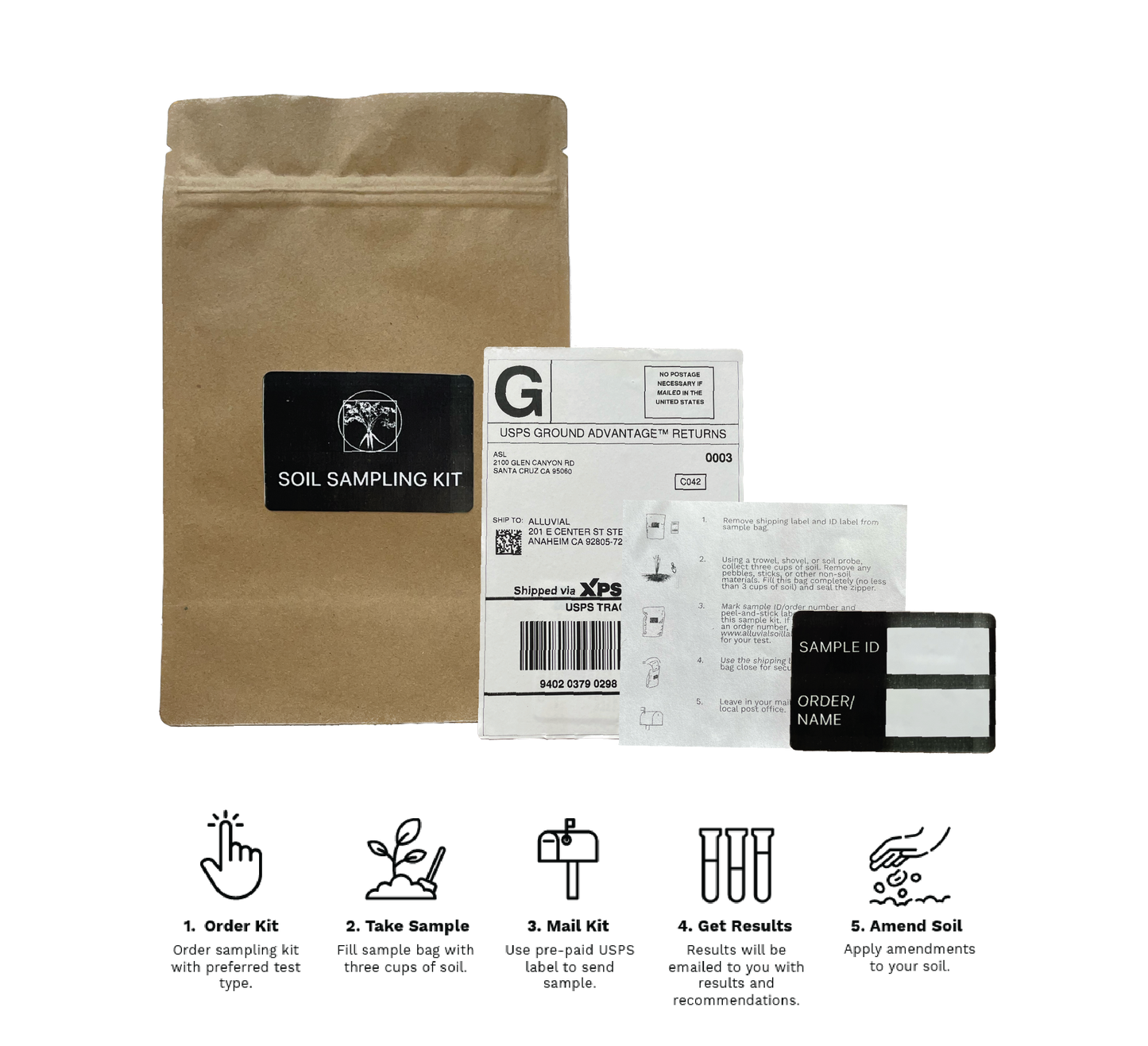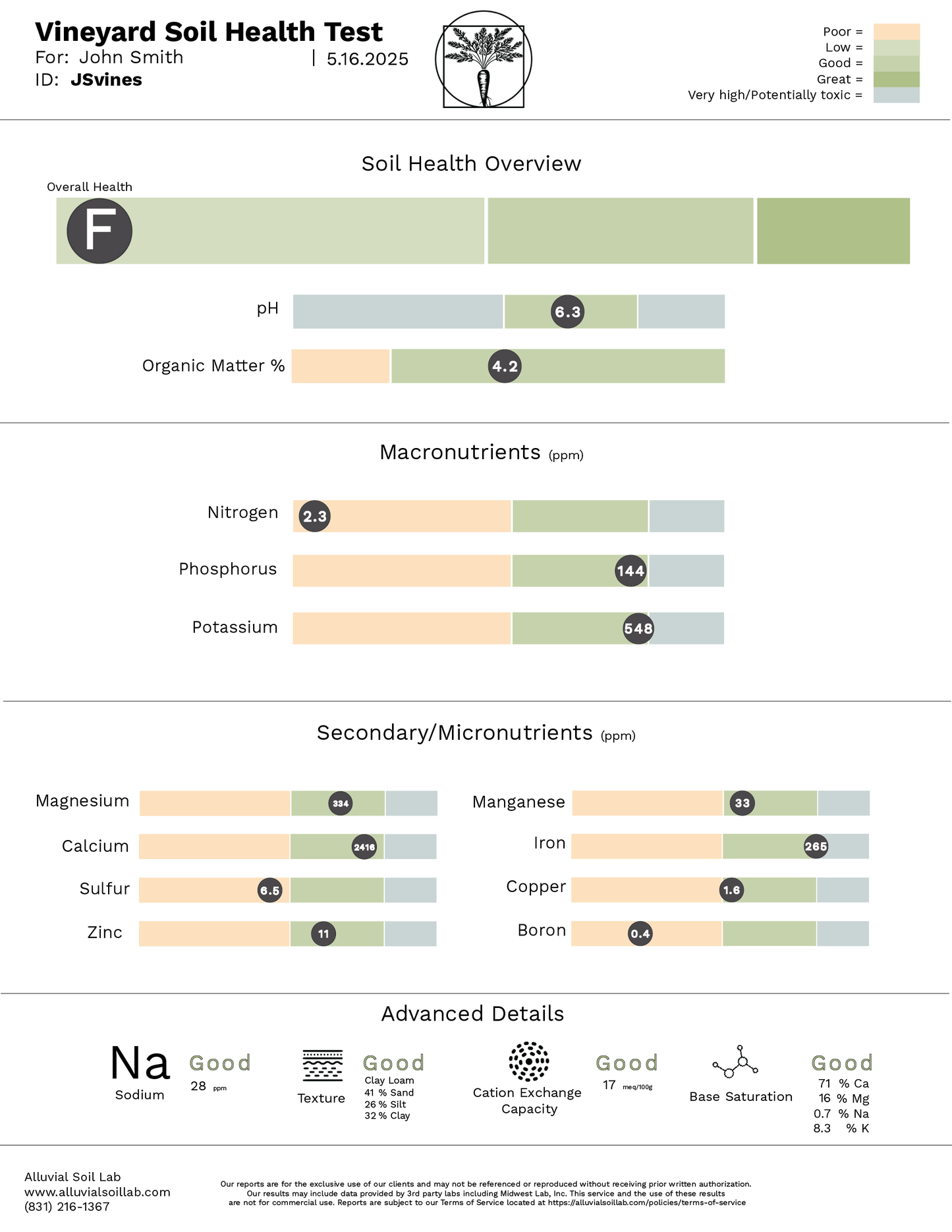Vineyard Soil Health Test
Vineyard Soil Health Test
The Vineyard Soil Health Test serves as a vital tool for evaluating soil fertility and suitability specifically tailored to the needs of wine grape cultivation. This comprehensive analysis delves into various critical parameters that impact both plant growth and soil sustainability, offering invaluable insights to cultivate the ideal soil conditions.
Couldn't load pickup availability
- Fast Turnaround Time
- Accurate Results
- Secure PCI/SSL Payment
- 30-Day Refunds
- Expert Recommendations
- Sustainable Packaging
Vineyard Soil Health Test
Unlock the potential of your vineyard with our Vineyard Soil Health Test Kit, designed to optimize vine growth and enhance grape quality. This comprehensive soil analysis provides actionable insights for sustainable viticulture.
What’s Included in the Report
- Graphs, Data Analysis, and Personalized Recommendations: Receive detailed graphs and tailored advice for organic or conventional amendments to improve soil health and grape production.
- 15-Minute Phone Consultation: Discuss your results with a soil scientist from Alluvial Soil Lab to refine your vineyard management strategy.
Nutrient Analysis
- NPK and Secondary Nutrients: Evaluates essential nutrients like nitrate, phosphorus, potassium, magnesium, and calcium, critical for robust vine health and grape quality.
- Micronutrients (Zinc, Manganese, Iron, Copper, Boron): Assesses micronutrient availability to support vital physiological processes, ensuring comprehensive nutritional support for vines.
- Sulfur: Measures sulfur levels, essential for amino acid and protein synthesis, directly impacting vine vitality and grape flavor.
Soil Composition and Structure
- Organic Matter: Quantifies organic matter to enhance soil structure, improve water retention, and boost nutrient availability for thriving vineyards.
- pH and Buffer Index: Analyzes soil acidity or alkalinity and its resistance to pH changes, ensuring optimal nutrient uptake for grapevines.
- Cation Exchange Capacity (CEC) and Percent Saturation of Cations: Measures soil’s ability to retain and exchange nutrients, supporting sustained vine growth and fruit development.
- Soluble Salts, Sodium, and Excess Lime: Identifies salinity, sodium, or lime issues that could hinder vine health, with recommendations to mitigate risks.
Physical Properties
- Texture: Determines soil texture (sand, silt, clay proportions), influencing water retention, drainage, and nutrient availability, all critical for vineyard success.
Soil’s Role in Vine Growth and Terroir
Soil type and fertility shape vine growth and define the unique terroir of your vineyard, directly influencing grape quality and wine flavor profiles.
Soil Types and Their Impact
Different soil types—loam, clay, sand, or combinations—impart distinct characteristics to vineyards, affecting vine growth and grape development.
- Loamy Soils: Balanced sand, silt, and clay provide excellent drainage, moisture retention, and nutrient availability, promoting vigorous vine growth and balanced grape flavors.
- Clay Soils: Fine particles with high water retention can risk waterlogging if not managed, but contribute to wines with intense flavors and strong structure.
- Sandy Soils: Excellent drainage but lower nutrient retention may reduce vine vigor, producing grapes with bright fruit flavors and elegant profiles.
Soil Fertility
Soil fertility, driven by nutrient content and organic matter, significantly impacts vine health and grape quality.
- Nutrient-Rich Soils: Support robust vine growth and high-quality grape production, leading to wines with depth and complexity.
- Nutrient-Deficient Soils: Can stunt growth, lower yields, and produce grapes with reduced flavor and character.
Terroir’s Unique Influence
Terroir reflects the interplay of soil, climate, topography, and management practices, creating distinctive wine characteristics.
- Soil Type and Fertility: Shape wine flavor, aroma, and structure through mineral uptake and vine vigor.
- Mineral Composition: Specific soil minerals enhance grape complexity, adding nuance to wine profiles.
- Vine Growth Patterns: Soil fertility influences canopy development and ripening, defining terroir expression in wines.
Optimize your vineyard’s potential with our Vineyard Soil Health Test Kit. Understand soil type, fertility, and terroir to craft exceptional wines that reflect your vineyard’s unique character. Contact us for expert soil health guidance.
Sampling instructions
Sampling instructions
Materials Needed
i. Clean plastic bucket
ii. Shovel or soil probe
iii. Plastic bag
iv. Labeling materials (marker, tape, or label)
v. Gloves & mask (for contaminated soils)
Sampling Process
Step 1: Define Sampling Area
i. Identify the specific area for testing.
ii. Collect one composite sample per 1,000 sq. ft.
Step 2: Collect Soil Samples
i. Use a clean bucket and shovel/probe to gather soil from three spots.
ii. Dig 6 inches deep, taking a vertical slice.
iii. Avoid compost piles, pet waste, or fertilized areas.
iv. Do not sample wet soil.
Step 3: Prepare Sample
i. Remove debris, break up clumps, and mix soil thoroughly.
Step 4: Package Sample
i. Measure 3 cups of mixed soil into a resealable plastic bag.
ii. Label with Sample ID, Test Type, and Order Number.
Step 5: Submit Sample
i. Purchase a test on our website.
ii. Mail to Alluvial Soil Lab, 201 E Center St, Ste 112-3083, Anaheim, CA 92805.
iii. Use any postal carrier.
For Soil Sample Kit Users
Step 1: Prepare Kit
i. Remove shipping label, ID tag, and instructions.
Step 2: Collect & Package Sample
i. Follow the standard collection process.
ii. Fill the provided bag completely.
iii. Attach the ID tag and secure the shipping label.
Turnaround and Results
i. Timing depends on test type.
ii. Results emailed with soil composition, nutrients, and recommendations.
Safety Precautions
i. Wear gloves/mask when handling potentially contaminated soil.
ii. Wash hands thoroughly after sampling.
Following these steps ensures accurate soil testing for better gardening decisions.
Advanced details
Advanced details
Test includes:
1. Organic Matter, Nitrate, Phosphorus, Potassium, Magnesium, Calcium, pH, Buffer Index, Cation Exchange Capacity, Percent Saturation of Cations, Sodium, and Excess Lime, Sulfur, Zinc, Manganese, Iron, Copper, Boron.
2. Texture
3. Recommendations
Suitability list includes up to (12) suitable varieties



Reviews
-

Jack Algiere | Stone Barns Center
Verified Purchase ✓
Alluvial Soil Lab provided us with comprehensive tests for our organic soil based greenhouse. The results were easy to read and will surely be a great tool for anyone looking to better understand their own soils.
-

Wilson H.
Verified Purchase ✓
I recently started a garden at a community plot, and wanted to know what was in my soil, so I could make more targeted amendments. Jake walked me through how to do so, and after sending my samples in... (read more)
-

Noah M.
Verified Purchase ✓
As a professional in the field I very much appreciate the timely and detailed report, along with skilled follow up communications. I will certainly use Alluvial Soil Lab's services again.
-

Zakary S.
Verified Purchase ✓
Great support and detailed report. Helped advise what options we had to plant trees! Plants are doing incredible! (read more)
-

Peggy C.
Verified Purchase ✓
I recently moved to a property with a vineyard, and wanted to know what type of fertilizers to use and how much to apply. So I did a soil test. I was new to soil testing and with Jake's help and instructions, I was able to successfully collect… (read more)
-

Adrian T.
Verified Purchase ✓
Alluvial makes complex scientific lab results accessible and legible for anyone.(read more)
-

Tom R.
Verified Purchase ✓
I wanted to start a vineyard on my land in Alpine, Ca. Unfortunately, it’s mostly clay. I contacted Alluvial and sent a soil sample...received a land rating with nutrient advice...the first test rows thrived, allowing me to plant more this Spring. Thank you! Couldn’t have done it without you. (read more)




